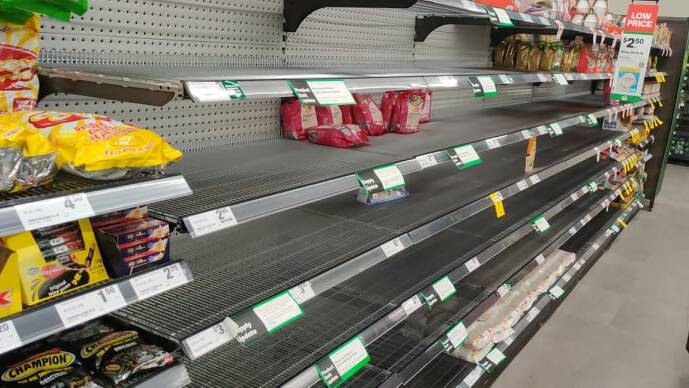
The cost of living is rising in Australia, with grocery bills a significant contributing factor.
Create a free account to read this article
$0/
(min cost $0)
or signup to continue reading
Heartbreaking stories have flooded local Facebook groups of families skipping meals to ensure their children don't go hungry, or having to skimp in other areas just to have enough money to cover the grocery bill.
Mandurah resident, Emma Jayne, is a single, stay-at-home mother of her 9-month-old. She spoke with the Mail on how difficult she is finding it to afford groceries nowadays.
"Normally I budget $150 a fortnight, I can't really go above that as I don't have any more money.
"Last week, my weekly shop came to $120. So I need to stretch that food an extra week. It is a contributing factor that basics like rice, pasta, etc. aren't available but bread has gone up, fresh produce has gone up, meat has gone up a ridiculous amount!" Ms Jayne said.
Recent panic buying as COVID-19 begins to take hold in Western Australia only exacerbates this issue of increasing grocery costs.
Ms Jayne explained that she started to notice a significant increase in prices at the grocery stores a few weeks ago, with empty-shelves and food shortages making it harder to stick to a budget.
"I noticed that a loaf of bread from Woolies which used to be $1.50 is now $2," Ms Jayne said, also noting that a carton of Coke which used to cost $22, now costs $42.
...I have skipped dinner for myself 3 times last week because I'm scared about running out.
When asked how she manages the increasing cost of groceries with other everyday expenses, Ms Jayne said her rent and bills always come first.
"But I have had to have my parents and friends get me some extra food so I could ensure I had enough," she said.
"I have skipped dinner for myself three times last week because I'm scared about running out.
"I had to cancel our health insurance so that I had enough for petrol and food. It's just getting outrageous."
Ms Jayne isn't the only one experiencing financial hardship as rising inflation and food shortages across Western Australia forces families to stretch their budgets further than before.
Another Mandurah local, Samantha Kate Penny, shared a similar story to Ms Jayne, explaining that the increasing cost of her fortnightly food shop meant that her fiance was working overtime to afford rising expenses.

"My fiance noticed the price increases last week when our little man needed more formula and due to panic buyers we had to grab a different brand that use to be $51.99 and is now $54.95," she said.
"I went up just this past weekend for some extra little bits and went to grab a cheap lasagna which use to be $12, it's gone up to $15.
"Honestly it's hitting us hard and now my fiance is having to do overtime again just to make sure we have extra money for food and fuel for both his bike and the car."
Rising prices also takes a significant toll on mental health. Ms Penny expressed how her anxiety has risen as a result of increasing grocery prices, and juggling the families budget.
"I hate going to Coles now as I use the calculator app on my phone every shop just to make sure we have enough for fuel as well and I hate it," she said.
"I get back in the car at the end and rub my face and have to just listen to the radio for a little bit to calm myself down."
Mandurah resident Kerry Rees said she noticed that her usual items were out of stock, forcing her to purchase higher priced goods.
"It usually costs $200 per week and at the moment we are going back several times a week so now about $350 as we can't get stuff we need," Ms Rees said.
"It's quite scary as I know I can do a lot with minimal ingredients but if I can't get stock items like flour, sugar, milk, eggs, then it can certainly play havoc on my mental health as I worry about what to do and how much it will cost."

Money Mentors Mandurah financial counselor Lani Reynolds said increasing grocery costs was a significant issue in the community.
"People are choosing whether they pay groceries or rent," she said.
"It affects every facet of your life. It can affect how you feel about yourself as a parent, as a person, how you operate in your job. It affects mental health, confidence, how you integrate with other people. Are you withdrawing from friends and family because you don't have the disposable income to do things you normally do?"
She added that one trend she has noticed in the community is many families waiting to purchase certain groceries on special, but finding those items rarely being marked down anymore.
Ms Reynolds advice for families struggling to afford groceries is to plan their meals and have a strict budget.
"Planning is really important, not leaving it to the day but trying to have a day when you decide what you're going to eat," she said.
"Try stick to a budget in terms of food, knowing you can't go in there and buy what you want. Repeated meals, using bulk supplies to pad meals out."
Money Mentors in Mandurah provides free financial counselling for locals. They are confidential and funded by the government. Ms Reynolds also noted that the National Debt Helpline was a useful resource for those struggling with financial hardship.
To contact a financial counselor on the National Debt Helpline, call: 1800 007 007.
For more information on Money Mentors and their services, visit: http://www.moneymentors.org.au/services/
Struggling to pay for groceries? Visit Feed it Forward on Facebook.

